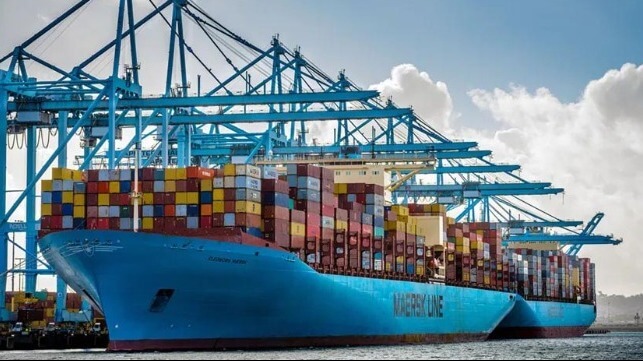Maersk Reports Best Financial Results While Expecting Steep Declines

Maersk reported what it called a “remarkable” year in 2022 with the best financial results in the history of the company while joining others in the shipping industry in warning of a softer market ahead for 2023. The shipping giant, which is closely followed as a bellwether for the global economy, is basing its outlook on the expectation that the inventory correction that began in the second half of 2022 will be completed by the end of the first half of 2023. They forecast a “more balanced demand environment,” as the industry moves forward in 2023 and beyond.
“The world is facing ‘a significant inventory adjustment’ after a period where demand has been ‘absolutely exceptional’,” said the new CEO of Maersk Vincent Clerc during an interview with Bloomberg TV. He repeated the earlier reports citing the abnormal market conditions in the first half of 2022 as providing the strength to carry the company forward as the markets declined later in 202. He highlighted that stable long-term contracts had helped the ocean freight business throughout the year while Maersk continued to pursue its transformation into a logistics company with large acquisitions in logistic services.
Clerc said that the fourth quarter of 2022 was impacted by lower volumes caused by weakening customer demand. He said that had triggered an easing of congestion and operating bottlenecks while also resulting in freight rates that were down from the peak levels reached by mid-2022.
“As congestions eased and declining consumer demand led to significant de-stocking in all segments, the expected normalization of the ocean market kicked in during the final stretch of the year,” Maersk said reviewing its financial performance.
The company experienced a more than one billion decline in overall profitability in the fourth quarter, to $5.1 billion (EBIT), led by the strong declines in the shipping segment. Revenues from the ocean segment of the company were down nearly nine percent in the fourth quarter to just over $13 billion while profitability for the segment was down by a quarter to $4.8 billion.
Despite the declines experienced in the fourth quarter, for the full year, Maersk reported a better than 30 percent increase in 2022 revenues to $81.5 billion contributing to the 56 percent increase in profitability for the year to nearly $31 billion. The ocean segment saw revenues increase for the year by more than a third to more than $64 billion providing more than $29 billion in profitability (EBIT) to the corporation.
Maersk however noted that it is entering a year with a challenging macro-outlook and types of certainties for customers. They nonetheless believe the current sharp correction in demand will stabilize by the second half of 2023. The company is forecasting global container market growth to be in the range of negative 2.5 percent to positive 0.5 percent for the year with Maersk expecting to be in line with the market.
Last year, Maersk saw its volumes fall from 26,178 TEU to 23,848 TEU globally, a decline of nearly nine percent. With the difference between contract and spot rates narrowing, Clerc told investors that they expect the ocean segment would have “very low” profitability in 2023. For all of A.P. Moeller-Maersk, the company is forecasting profits will tumble from the nearly $31 billion in 2022 to between $2 to $2.5 billion in 2023.
Maersk however expects to continue its investments in the business and to address the challenges of decarbonization. They forecast $10 to $11 billion in capital expenditures (CAPEX) as well as a restructuring charge of $450 million in the first quarter related to the efforts to restructure and rebrand globally as Maersk. With an expectation that the slow-down in the global economy will lead to a softer market in particular for its shipping operations, Maersk said it will continue to pursue growth opportunities within its logistics and terminal businesses.
